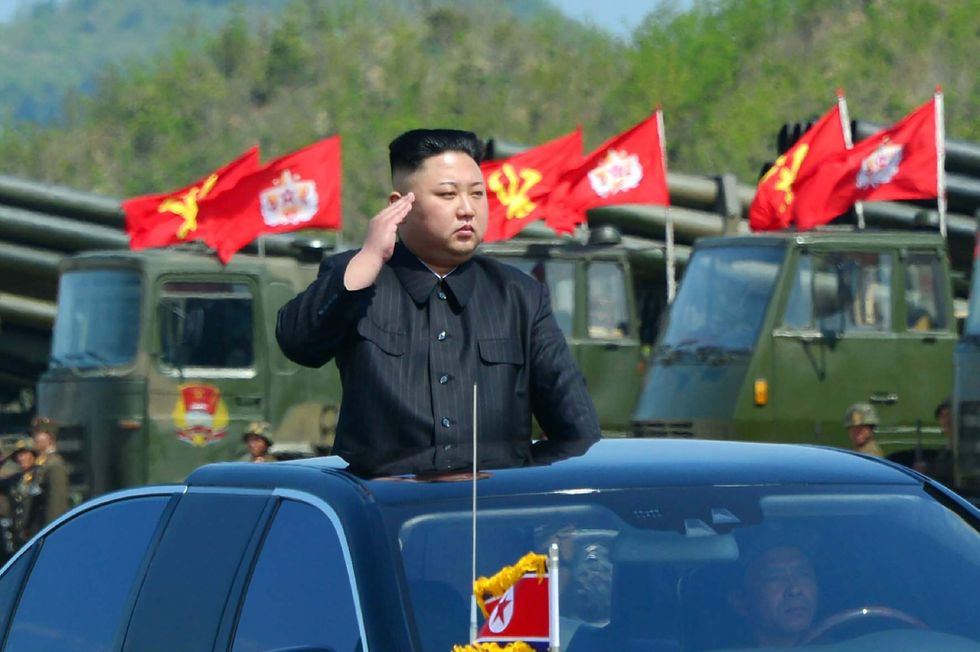
President Trump and Japanese Prime Minister Abe have both agreed to put further pressure on North Korea after Tuesday morning's missile launch, but will it work? (Getty Images)

President Donald Trump and Japanese Prime Minister Shinzo Abe have both agreed to put more pressure on North Korea after Pyongyang fired a missile over Japan on Tuesday.
According to the Guardian, South Korea said the missile launched Tuesday morning — believed to be a new intermediate-range Hwasong-12 — may have flown further than any other before it. Furthermore, it's the most provocative launch to date, having sent the missile directly over Japanese lands with a much flatter trajectory.
“The outrageous act of firing a missile over our country is an unprecedented, serious and grave threat and greatly damages regional peace and security,” Abe told reporters according to the Guardian.
The Guardian reported that Abe said Japan would “strongly call for increased pressure on North Korea in cooperation with the international community” via the United Nations Security Council and that Trump was “100% with Japan."
The paper further reported that China urged restraint in response to the missile launch, believing that the Korean Peninsula is at “a tipping point approaching a crisis.”
“Think hard about it, who do you think should take the blame, if China is urging all parties to calm down while one party holds constant military exercises … and the other is constantly launching missiles?” Chinese Foreign Ministry spokeswoman Hua Chunying told reporters in Beijing during a daily press briefing, according to the Guardian.
The "constant military exercises" Chunying referred to are the joint exercises held annually by the U.S. and South Korea. The drills are meant to keep both militaries in a state of preparedness against the volatile communist North Korea.
According to Newsweek, China, Russia, and North Korea all consider these drills antagonistic. Russian Deputy Foreign Minister Sergei Ryabkov told journalists Tuesday that the exercises provoked North Korea's missile launch over Japan. SOURCE?
“We consider the joint drills that went ahead anyway, albeit in a lighter mode compared to the initial agenda, made an impact in terms of provoking Pyongyang to make the new launch. We are highly concerned by the general developments,” Ryabkov said.
However, U.S. military officials view the drills as necessary to peace, as it displays and maintains strength. Gen. Vincent Brooks, commander of the U.S. Forces in Korea, said the exercises will continue to happen every year until the joint forces “have reason not to.”
There are two immediately clear possibilities.
The first is that Pyongyang launched the missile in order to keep up the appearance of defiance and independence. North Korea does not — and for appearance's sake cannot — suffer slights against it without a response. Sanctions against it are generally met with overt responses of defiance. The regime of North Korean President Kim Jong Un feels it must maintain an illusion of power and control.
The second is that North Korea is attempting to goad the U.S. into war and pushing Washington to strike first. Trump throwing the first punch would set of a chain reaction that could possibly launch us into World War III.
China warned that should the U.S. strike North Korea first, then China would intervene on North Korea's behalf. China also warned Pyongyang that should it strike first, Beijing would remain neutral.
However, Washington is up against a very difficult decision. Trump has stated in the past that he will not tolerate a nuclear North Korea, but North Korea has no intention of stopping the development of their nuclear ICBM program. So far, the U.S. and the U.N. have resorted to sanctions against North Korea, but to no effect.
In fact, the sanctions just seem to make the problem worse.
Hugh White, Professor of strategic studies at the Australian National University, wrote for the Straits Times on Monday that no one really expects further sanctions to work on Pyongyang's decision to curb a missile program they've already invested in greatly.
"So military action seems the only possible option," White wrote. "Senior US officials themselves acknowledge that there is no military solution which does not run a very high risk indeed of escalating into a major war on the Korean Peninsula costing hundreds of thousands of lives — or even more if nuclear weapons were used."
Furthermore, White noted that North Korea is on the verge of becoming the nuclear power Trump promised he would prevent. If he does strike, it will have to be soon and before North Korea has the ability to strike back.
"That is not a remote question. All the evidence points towards the North being perhaps only a matter of months away from its goal. Any US attack on North Korea would obviously be much riskier for Washington once it has ICBMs. So if Mr Trump is going to stop North Korea he would have to act soon — which means striking North Korea hard the next time it conducts a test."
"If he launches a military strike, he will turn Asia, and the world, upside down," White added.
The alternative, White said, is simply living with a nuclear North Korea. However, this presents two different problems: First, a volatile state will be nuclear-capable. Second, it will send a signal that all of Trump's strong-man rhetoric is simply hot-air.
North Korea's hatred of the U.S. is not something they're shy about expressing. If Washington were to strike first, North Korea would love nothing more. It would mean China, and possibly Russia, would come to the aid of their communist little brother. The resulting conflict could be catastrophic, not just for the Korean Peninsula, but for the world.